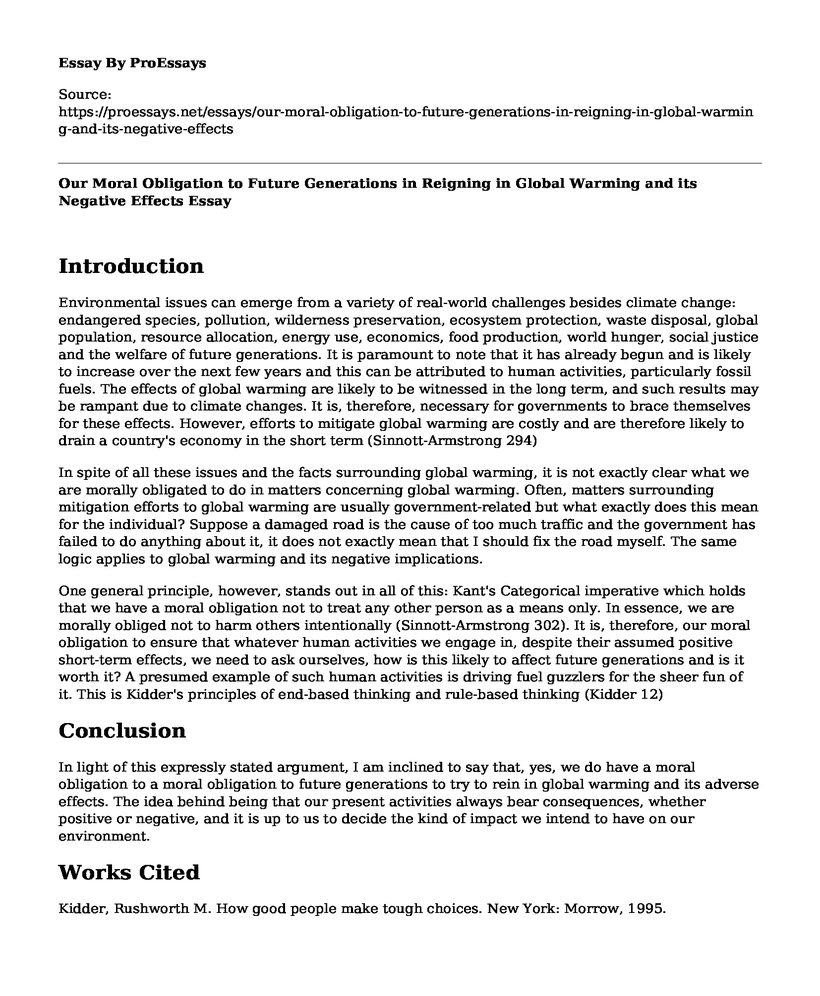Introduction
Environmental issues can emerge from a variety of real-world challenges besides climate change: endangered species, pollution, wilderness preservation, ecosystem protection, waste disposal, global population, resource allocation, energy use, economics, food production, world hunger, social justice and the welfare of future generations. It is paramount to note that it has already begun and is likely to increase over the next few years and this can be attributed to human activities, particularly fossil fuels. The effects of global warming are likely to be witnessed in the long term, and such results may be rampant due to climate changes. It is, therefore, necessary for governments to brace themselves for these effects. However, efforts to mitigate global warming are costly and are therefore likely to drain a country's economy in the short term (Sinnott-Armstrong 294)
In spite of all these issues and the facts surrounding global warming, it is not exactly clear what we are morally obligated to do in matters concerning global warming. Often, matters surrounding mitigation efforts to global warming are usually government-related but what exactly does this mean for the individual? Suppose a damaged road is the cause of too much traffic and the government has failed to do anything about it, it does not exactly mean that I should fix the road myself. The same logic applies to global warming and its negative implications.
One general principle, however, stands out in all of this: Kant's Categorical imperative which holds that we have a moral obligation not to treat any other person as a means only. In essence, we are morally obliged not to harm others intentionally (Sinnott-Armstrong 302). It is, therefore, our moral obligation to ensure that whatever human activities we engage in, despite their assumed positive short-term effects, we need to ask ourselves, how is this likely to affect future generations and is it worth it? A presumed example of such human activities is driving fuel guzzlers for the sheer fun of it. This is Kidder's principles of end-based thinking and rule-based thinking (Kidder 12)
Conclusion
In light of this expressly stated argument, I am inclined to say that, yes, we do have a moral obligation to a moral obligation to future generations to try to rein in global warming and its adverse effects. The idea behind being that our present activities always bear consequences, whether positive or negative, and it is up to us to decide the kind of impact we intend to have on our environment.
Works Cited
Kidder, Rushworth M. How good people make tough choices. New York: Morrow, 1995.
Sinnott-Armstrong, Walter. "It's not my fault: Global warming and individual moral obligations. In W. Sinnott-Armstrong & RB Howarth." Perspectives on climate change: Science, economics, politics, ethics (2005): 285-307. Retrieved from:https://sites.duke.edu/wsa/papers/files/2011/05/wsa-itsnotmyfault2005.pdf
Cite this page
Our Moral Obligation to Future Generations in Reigning in Global Warming and its Negative Effects. (2022, Mar 16). Retrieved from https://proessays.net/essays/our-moral-obligation-to-future-generations-in-reigning-in-global-warming-and-its-negative-effects
If you are the original author of this essay and no longer wish to have it published on the ProEssays website, please click below to request its removal:
- Improving Air Quality in UAE
- Capilano Suspension Bridge and Green Cities Revitalization Paper Example
- Environmental Influences on Health and Healthcare and the Social Construction of Health and Disease - Essay Sample
- Paper Example on Biodiversity and Ecology Foundations
- Essay Example on Renewable Energy: Growing Demand & System Flexibility
- Air Pollution: A Crisis More Deadly Than Any Pandemic - Essay Sample
- Business Ethics Water Pollution - Report Example







